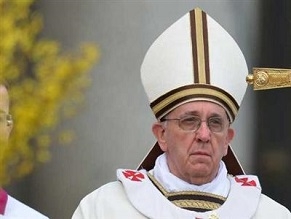|
World Jewish News

Pope Francis called on Israelis and Palestinians to “willingly and courageously resume negotiations” in the stalled peace process to end their common “struggle to find the road of agreement”.
|
New Pope Francis calls for Middle East peace in Easter address ‘to end a conflict that has lasted all too long’
02.04.2013, Israel and the World The newly-elected Pope used his first Easter address Sunday to deliver a rousing call for Middle East peace, as he appealed on Israelis and Palestinians to “willingly and courageously resume negotiations” in the stalled peace process to end their common “struggle to find the road of agreement.”
His message was echoed by that of the Latin Patriarch of Jerusalem, Fouad Twal, who invited the pope to visit the Jewish State, as he called on the international community to take “concrete and effective decisions to find a balanced and just solution for the Palestinian cause, which lies at the heart of all the Middle East’s troubles”.
Ahead of his annual address Thursday, the pope washed and kissed the feet of 12 people at a youth detention centre, including two girls and two Muslims, in an unprecedented gesture he said was a mark of “friendship of our Muslim brothers and sisters” in the Middle East.
Despite his apparent marked overtures to the Muslim community, the Jesuit pope is thought to have maintained good relations with the Jewish community in his native Argentina, where he was praised by local and American Jewish leaders for his prompt response to the 1994 bombing of the Argentine Jewish community centre (AMIA).
Argentine Pope Francis, the first non-European pope to be elected in almost 1,300 years earlier this month following the resignation of his predecessor Benedict XVI, continued to expand his hopes for peace across the world in his Easter speech, as he raged against “the selfishness which threatens human life and the family”.
Other regions coming in from special mention included civil war-torn Syria, as he questioned “hoe much blood has been shed and how much suffering must there still be before a political solution is found”.
Welcoming his election earlier this month, EU Council President Herman Van Rompuy and EU Commission head Jose Manuel Barroso issued a statement expressing hopes the first Latin American pope would continue “to defend and promote the fundamental values of peace, solidarity and human dignity”.
Calling for him to expand on his predecessor’s well-documented interfaith work, they further encourage him to “bring the world’s people and religions closer together”.
Meanwhile in Washington, US President Barack Obama used his own Easter greetings Friday in the immediate aftermath of Monday’s annual White House Seder night to celebrate the Jewish festival of Passover, to preach an interfaith message of common humanity, as he insisted that the Christian values of loving your neighbour as yourself “are at the heart not just of the Christian faith; but of all faiths”.
“From Judaism to Islam; Hinduism to Sikhism; there echoes a powerful call to serve our brothers and sisters. To keep in our hearts a deep and abiding compassion for all. And to treat others as we wish to be treated ourselves. That’s the common humanity that binds us together. And as Americans, we’re united by something else, too: faith in the ideals that lie at the heart of our founding; and the belief that, as part of something bigger than ourselves, we have a shared responsibility to look out for our fellow citizens,” he added.
Ahead of the White House Passover commemoration, which closely followed his visit to the Jewish State the previous week, Obama equated the Middle East peace process with the Jews’ own history of slavery in their own land. Invoking Israel’s responsibilities to all races and religions residing there, he said: “Passover is a celebration of the freedom our ancestors dreamed of, fought for, and ultimately won. But even as we give thanks, we are called to look to the future. We are reminded that responsibility does not end when we reach the promised land, it only begins.”
Expressing his hopes for the resuscitation of direct peace talks, following his well-received meetings with both Israeli and Palestinian administrations, he concluded: “I am hopeful that we can draw upon the best in ourselves to find the promise in the days that lie ahead, meet the challenges that will come, and continuing the hard work of repairing the world.”
by: Shari Ryness
EJP
|
|
